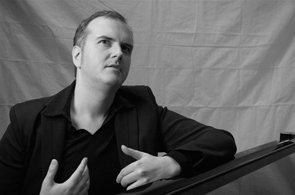Nicholas Angelich at the Corcoran
 A black, shiny surprise awaited the audience in the sparsely filled Hammer Auditorium of the Corcoran Gallery Wednesday night when, instead of the raggedy Steinway of debatable quality, a Yamaha concert grand greeted them from the stage. Working on it that night, as part of the “Les Grands Pianistes” series that the Corcoran Gallery and the Maison Française co-present, was the U.S.-born French pianist Nicholas Angelich. The second of originally four (but after Alexandre Tharaud’s cancellation only three) pianists in that series, his performance was going to be measured against the considerable standard set by François-Frédéric Guy, the pianist who went first in this line... and it measured up nicely.
A black, shiny surprise awaited the audience in the sparsely filled Hammer Auditorium of the Corcoran Gallery Wednesday night when, instead of the raggedy Steinway of debatable quality, a Yamaha concert grand greeted them from the stage. Working on it that night, as part of the “Les Grands Pianistes” series that the Corcoran Gallery and the Maison Française co-present, was the U.S.-born French pianist Nicholas Angelich. The second of originally four (but after Alexandre Tharaud’s cancellation only three) pianists in that series, his performance was going to be measured against the considerable standard set by François-Frédéric Guy, the pianist who went first in this line... and it measured up nicely.Brahms Piano Works Brahms Violin Sonatas Brahms Piano Trios Beethoven Sonatas Liszt "Années de pèlerinage" (currently out of catalog) |
Brahms came with a crystalline sound whenever bolder tones were struck in the Fantasien, op. 116 – namely the opening and closing Capriccios in D Minor… in between Angelich returnd to his languid, nocturnal style of interpretation. A little pedal heavy at times and always with some inflection (imagine Backhaus as the polar opposite of this style), the Brahms was personal, woolly, comforting to most, and perhaps too obsessive or wrought with sedative romanticism for a few dissenting ears. The four Klavierstücke, op. 119 (three Intermezzi in B Minor, E Minor, and C Major; Rhapsodie in E-flat Major), made the preceding “Capriccios” seem more important: Amid all that Brahms and Schumann (a complacent, meandering mélange of on-the-sleeve romanticism) they represented a jolt of life. How a dry, crisp two-movement Beethoven sonata might have provided desirable contrast!) But if romantic monochromaticism is no deterrent to one's musical palate, the Klavierstücke will have been keenly enjoyed. Especially the C Major Intermezzo (where brevity aids inventiveness to great effect) and the E-flat Major Rhapsodie that came like a needed breath of fresh air to the recital.
If the Rhapsodie was a “breath of fresh air,” though, the two Bach encores (the Allemande from the Second Partita and the Gigue from the Second English Suite) were like musical detoxification or at least a ‘taking to the baths’ at a Spa. They were indeed beyond ‘welcome’: They were a necessity of enormous grace and beauty – not all of which was due just to the ingenuity of Bach’s music, either. Rarely was it more true or plain that encores are indeed “gifts” from the performer to the audience.

A repeat performance of this or a similar recital took place at the Maison Française on Thursday night. The next performance in this series will be that of Pierre-Laurent Aimard in May.






















































1 comment:
Unfortunately, the Corcoran is not offering an Aimard recital, so their series is finished now after Tharaud's cancellation. Now that's a disappointment.
Post a Comment